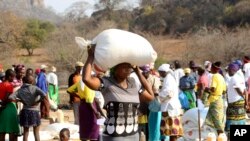Zimbabwe joined the rest of the world in marking World Food Day Friday with food shortages looming ahead of the new cropping season as the United States dollar remains elusive for the ordinary Zimbabwean.
Most people who spoke with VOA Studio 7 said the food situation is getting dire with most families now resorting to one meal a day to survive as compared to same time last year.
Emelda Chapeta, a mother of four, says she doesn’t know what to do or who to turn to as she struggles daily to feed her family.
“Life as we know it has really changed and most of us can hardly afford three meals a day,” said Chapeta.
“Food has become so scarce for most of us even though we see it in the shops, we just cannot afford it. We do not have the money. Some time back you could go to neighbors but now, almost everyone is affected.”
A Mola villager from Sia Kobvu, along Zambezi River, Milton Masaba, says there is no food in the area because of inadequate rainfall during the last rainy season.
“The situation is getting worse by the day largely because of the last rainy season that was so bad that the majority of the people did not harvest enough,” said Masaba.
“There just isn’t enough food to go around, especially in the rural areas.”
Masaba said in his area most villagers are now surviving on food for work programs being administered by United Methodist Church.
Chikonohono resident, Tinashe Mapuranga, says the country’s economic crisis is to blame for the food shortages.
“You find in the townships people are now surviving on buying small packets of food rations called “tsaona” to survive as they can no longer afford buying food in bulk,” he said.
Zimbabwe Human Rights Organisation chairperson, Passmore Nyakureba, says ZimRights is concerned by the partisan distribution of food by the ruling Zanu PF in affected areas.
“Many people who do not belong to any political party or belong to opposition parties report that they are being left out of the food aid distribution chain and it is one thing that needs to be addressed to ensure everyone who deserves assistance receives it,” said Nyakureba.
He says the problem of food shortages in the country is not a result of the drought but poor planning by the government.
The United Nations Food and Agriculture OrganiSation (FAO) says about 2.17 million Zimbabweans need food aid from now until end of March 2016 due to poor harvests last season.
Harare has promised to buy enough food so no-one dies from hunger but activists say they are worried by reports some of the food aid is being politicized.






